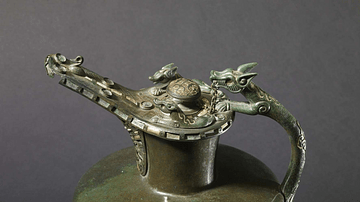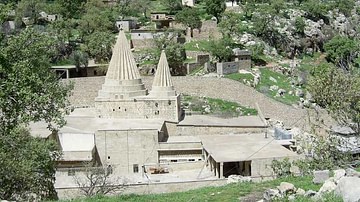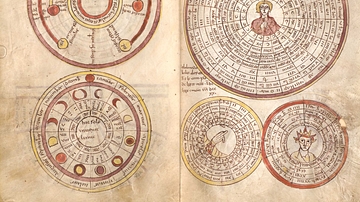Search
Search Results

Definition
Ehecatl
Ehecatl was a Mesoamerican god of air and winds, especially those which brought rains. Regarded as a manifestation of the great feathered serpent god Quetzalcoatl, he was sometimes known as Quetzalcoatl-Ehecatl, in which guise he helped create...

Definition
Sima Qian
Sima Qian (l. 145/135-86 BCE) was a court scribe, astrologer, and historian of the Han Dynasty (202 BCE - 220 CE) of ancient China, famous for his historical work Records of the Grand Historian for which he is remembered as the Father of...

Definition
Lepenski Vir
Lepenski Vir (Serbian Cyrillic: Лепенски Вир, “Lepena Whirlpool”) is an ancient settlement on the banks of the Danube in eastern Serbia; more precisely, in Boljetin village, near Donji Milanovac. The site shows evidence of a culture which...

Article
Festivals in Ancient Egypt
The gods of the ancient Egyptians were always apparent to the people through natural events. The sunrise was Ra emerging from the underworld in his great ship, for example, and the moon was the god Khonsu traveling across the night sky. When...

Article
Celtic Feasts
Feasts were an important part of ancient Celtic culture which marked important dates in the calendar and community successes. They were, too, an opportunity to display social status and, of course, eat and drink aplenty. Drunkenness and brawling...

Definition
Saturn
Saturn (Saturnus) was a Roman god with a similar history to Cronus from Greek mythology. Often depicted in art wielding a scythe he was considered an agricultural god, especially associated with seed-corn. The Saturnalia festival, named after...

Definition
Cult of the Supreme Being
The Cult of the Supreme Being was a deistic cult established by Maximilien Robespierre (1758-1794) during the French Revolution (1789-1799). Its purpose was to replace Roman Catholicism as the state religion of France and to undermine the...

Definition
Yazidism
Yazidism is a syncretic, monotheistic religion practiced by the Yazidis, an ethnoreligious group which resides primarily in northern Iraq, northern Syria, and southeastern Turkey. Yazidism is considered by its adherents to be the oldest religion...

Image
Vendémiaire
An illustration in the French Republican Calendar for the month of Vendémiaire Year VI, or September-October 1797 in the Gregorian calendar. Vendémiaire was the first month of the year under the Republican Calendar. By Salvatore Tresca and...

Image
Depiction of Metonic cycle
Depiction of the 19 years of the Metonic cycle as a wheel, with the Julian date of the Easter New Moon, from a 9th-century computistic manuscript made in St. Emmeram's Abbey.